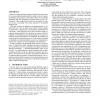Free Online Productivity Tools
i2Speak
i2Symbol
i2OCR
iTex2Img
iWeb2Print
iWeb2Shot
i2Type
iPdf2Split
iPdf2Merge
i2Bopomofo
i2Arabic
i2Style
i2Image
i2PDF
iLatex2Rtf
Sci2ools
136
click to vote
OOPSLA
2005
Springer
2005
Springer
Safe futures for Java
is a simple and elegant abstraction that allows concurrency to be expressed often through a relatively small rewrite of a sequential program. In the absence of side-effects, futures serve as benign annotations that mark potentially concurrent regions of code. Unfortunately, when computation relies heavily on mutation as is the case in Java, its meaning is less clear, and much of its intended simplicity lost. This paper explores the definition and implementation of safe futures for Java. One can think of safe futures as truly transparent annotations on method calls, which designate opportunities for concurrency. Serial programs can be made concurrent simply by replacing standard method calls with future invocations. Most significantly, even though some parts of the program are executed concurrently and may indeed operate on shared data, the semblance of serial execution is nonetheless preserved. Thus, program reasoning is simplified since data dependencies present in a sequential pr...
Related Content
| Added | 28 Jun 2010 |
| Updated | 28 Jun 2010 |
| Type | Conference |
| Year | 2005 |
| Where | OOPSLA |
| Authors | Adam Welc, Suresh Jagannathan, Antony L. Hosking |
Comments (0)

